I’m busy. Super busy at the moment: working on my PhD, running a busy household, writing and, of course, trying to run my career as an author. Some days it feels like that last one is the bit that gets pushed to the side. I have to give priorities to my family, I have to work on my studies (submission date is creeping ever closer) and I’m a writer, so I have to write. But my career? When do I get time to work on that: to boost my skills, boost my brand, promote my books (and myself)?
The simple answer is, I need to be doing things every day. And, if you want to make a living as a creator, so do you. So, here the things I try to do every day, most of which take very little time, to ensure my career keeps moving.
- Read. Okay, so this one can take as much or as little time as you like, but if you want to be a writer, you need to keep reading, no matter how busy you are. For me, it’s a combination of reading children’s books to stay abreast of what’s out there, and to grow my own skills through exposure to good writing, as well as reading more broadly for lots of reasons. I read news articles and commentary to keep abreast of what’s happening in the world, I read blogs from other writers and industry people, I read in genres other than my own to again grow my skills. Don’t have time to read? Then you don’t have time to be a writer. Or, you make/snatch the time. I carry a book wherever I go. I multi task – I read good stuff in waiting rooms, rather than old magazines. I read my blog feeds while eating lunch, I listen to audiobooks when I’m driving. Whatever it takes.
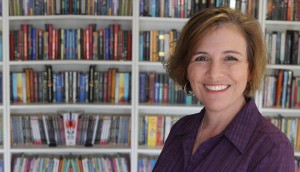
You can see I never run out of reading materials. My house is full of books.
- Write. I’ve already labelled this as one of the things I put before developing my career – but it is, in essence, at the very centre of my career. I wish I could say I write for hours every day, but at the moment my studies preclude hours and hours, and when I’m juggling those other things on my list, sometimes there isn’t even an hour left in my day. But again, I make it a priority to write something new at least five days a week – even if that something new is just a short poem. It’s not always good writing, but getting it down is what matters. You want to be a writer, you gotta write, and that means making the time, not waiting for the time to magically appear.
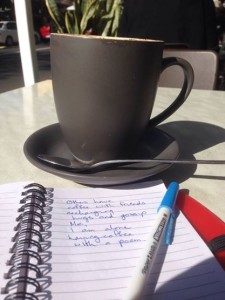
- Tell people you are a writer. If you want to be a professional, you gotta act the part. In the past, I kept a bit quiet about my writing, because I felt like I was showing off, or thought people might not be interested. I would say ‘I work from home’ or simply “I write”. Now, when people ask me what I do, I always say ‘I’m a children’s book author’. Then, if they ask for more detail I tell them, and I always have a business card in my wallet which I present when they ask where they can find out more. This isn’t pushy: it’s professional.
- Tell yourself you are a writer. If it helps, dress for the part. Sometimes when I am not feeling very authorish, I’ll put on my favourite big earrings or colourful clothes that I wear for school appearances: even though I’m not going anywhere.
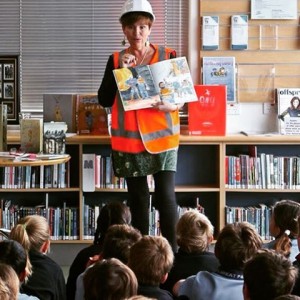
- Do at least one thing every day to promote yourself and/or your books. For me, that means using social media: as well as this blog and website, I have a twitter account, Facebook author page, Instagram and Pinterest accounts. I don’t do every one every day, but I make sure I do at least one. It takes 30 seconds to compose a tweet or Facebook status. Not every post has to be saying ‘buy my book’ – in fact, though it’s the subject for a post of its own, very very few posts should do that, if any at all. Promotion might be letting people know where you are appearing, where your books have been spotted in bookstores, book news and so on, or it might be simply engaging with readers and potential readers by sharing interesting links, or photos or world views. I combine my social media with my reading, by tweeting and facebooking articles I find about matters relating to reading, literature and poetry.
- Be organised. It is a career and it must be treated as such. For me, this means that when I sit at my desk in the morning, I make a list of anything that MUST be done that day and I cross it off as I go. I also have a longer running list of objectives, which I revise weekly. On my daily list I include emptying my inbox, and promotion tasks, as well as the writing and study things I need to complete. If I’m honest with you, I don’t always get everything on my list done, but when I sit down the next day I see the uncrossed things and put them at the top of that list.
- Lastly, but most importantly, enjoy the ride. Some days – most days, being an author is hard slog. But every day I try to remember to smile, if not about something that’s happened that day, then at least by looking back. From my desk I can see copies of my published books, the wards I’ve won and other reminders that I AM an author. So, while some days the smile comes from the joy of creation, or an acceptance, or lovely feedback, or just finally finding the perfect word, other days I look up from my desk and see those reminders. If you can’t find anything to enjoy about being a writer, it’s just hard work. When there’s a smile on your face the work is easier – and better, too.
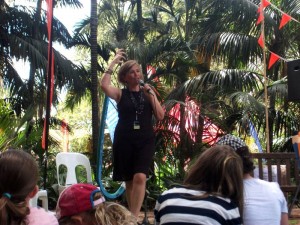
That’s my seven. What about you? Is there something YOU do every day that you’d suggest other writers do?
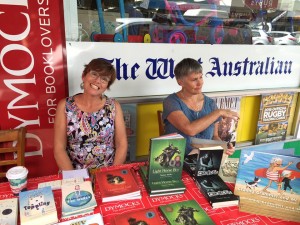
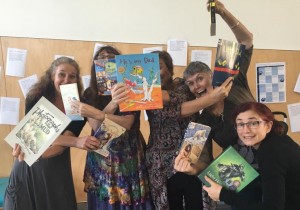
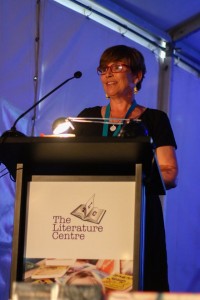
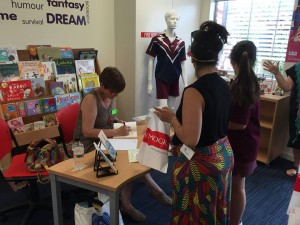
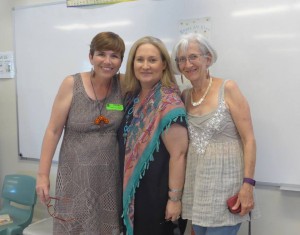 more. What a wonderful host David is.
more. What a wonderful host David is.